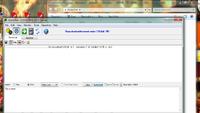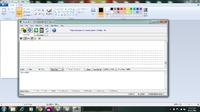Follow along with the video below to see how to install our site as a web app on your home screen.
Note: This feature may not be available in some browsers.

#pragma config OSC=INTIO67, LVP=OFF, MCLRE=ON , WDT=OFF

Is the "Configuration Bits set in code" check box checked?
BigDog

#include <p18f4620.h>
#include <usart.h>
#include <delays.h>
// INTIO67 configures internal oscillator
//#pragma config OSC=INTIO67, LVP=OFF, MCLRE=ON , WDT=OFF
void setup(void)
{
/* Clock Setup*/
OSCCON = 0b01110010; //select 8 MHz clock
/* Port Set Up*/
ADCON1 = 0b00001111; //set all pins to digital mode
TRISD = 0x00;
TRISA = 0x00;
TRISB = 0b00000000;
TRISC = 0b10000000; // RX is an input, TX is output
/* Interrupt Setup */
INTCON = 0x00; /* Clear Registers */
PIR1 = 0x00;
PIE1 = 0x00;
// Turn on the 4 LEDs
// Microchip recommends writing to the PORT Latch rather than the PORT Pins
LATBbits.LATB0=1;
LATBbits.LATB1=1;
LATBbits.LATB2=1;
LATBbits.LATB3=1;
}
void main(void)
{
int n = 12;
setup();
while(1)
{
while (n--)
{
Delay10KTCYx(100);
// Blink the 4 LEDs
// Microchip recommends writing to the PORT Latch rather than the PORT Pins
LATBbits.LATB0 = ~LATBbits.LATB0;
LATBbits.LATB1 = ~LATBbits.LATB1;
LATBbits.LATB2 = ~LATBbits.LATB2;
LATBbits.LATB3 = ~LATBbits.LATB3;
}
OpenUSART (USART_TX_INT_OFF & USART_RX_INT_OFF & USART_ASYNCH_MODE & USART_EIGHT_BIT & USART_CONT_RX & USART_BRGH_LOW, 12);
n = 150;
while (n--)
{
Delay10KTCYx(100);
putrsUSART(" Hello World! ");
}
CloseUSART();
}
}







However, if you open the project up and then program the PIC, neither work.
BigDog




You mean without opening MPLAB, the file I sent you worked but when you programmed through MPLAB it didn't?
This morning I got a new PIC18f4620 and installed in my board, Same error ! I think I will switch to a PIC16 and HIGH-TEC C now !
Ok so I have some new info to share on this issue. I went back to perform a loop back test on the board. I took the PIC out and connected Tx and Rx on the DIP and as expected it worked fine!
Test1: Nothing connected to Tx and Rx. I used AccessPort to send "This is test" to the board, but since the two pins ( Tx and Rx) arents connected, we shouldnt get anything back right? But to my surprise I got this( see image below). Is this just noise or what exactly is it? Btw test result is not repetitive- sort of like one off!

Test 2: I connected wire to Tx and left thr other end open. I got this ( see pic below) . Is that just noise? This test result is repetitive! Also when I "stop send" , the lines still keeps going. Its constantly sending these "dots" to PC !

This morning I got a new PIC18f4620 and installed in my board, Same error ! I think I will switch to a PIC16 and HIGH-TEC C now !
Ok so I have some new info to share on this issue. I went back to perform a loop back test on the board. I took the PIC out and connected Tx and Rx on the DIP and as expected it worked fine!
Test1: Nothing connected to Tx and Rx. I used AccessPort to send "This is test" to the board, but since the two pins ( Tx and Rx) arents connected, we shouldnt get anything back right? But to my surprise I got this( see image below). Is this just noise or what exactly is it? Btw test result is not repetitive- sort of like one off!

Test 2: I connected wire to Tx and left thr other end open. I got this ( see pic below) . Is that just noise? This test result is repetitive! Also when I "stop send" , the lines still keeps going. Its constantly sending these "dots" to PC !



#include <p18f4620.h>
#include <stdio.h>
#include <delays.h>
#include <usart.h>
// INTIO67 configures internal oscillator
#pragma config OSC=INTIO67, LVP=OFF, MCLRE=ON , WDT=OFF
void setup(void)
{
/* Clock Setup*/
OSCCON = 0b01110010; //select 8 MHz clock
/* Port Set Up*/
ADCON1 = 0b00001111; //set all pins to digital mode
TRISD = 0x00;
TRISA = 0x00;
TRISB = 0b00000000;
TRISC = 0b10000000; // RX is an input, TX is output
// Turn on the 4 LEDs
// Microchip recommends writing to the PORT Latch rather than the PORT Pins
LATBbits.LATB0=1;
LATBbits.LATB1=1;
LATBbits.LATB2=1;
LATBbits.LATB3=1;
/* Interrupt Setup */
INTCON = 0x00; /* Clear Registers */
PIR1 = 0x00;
PIE1 = 0x00;
TMR1L = 0x00;
TMR1H = 0x00;
T1CON = 0x00;
RCON = 0x00;
/* RS232 Enable */
// OpenUSART Configures The Next Three Lines
//RCSTA = 0b10000000;
//TXSTA = 0b00100000;
//BAUDCON = 0b01000000;
// USART 9600 8-N-1
OpenUSART (USART_TX_INT_OFF & USART_RX_INT_OFF & USART_ASYNCH_MODE & USART_EIGHT_BIT & USART_CONT_RX & USART_BRGH_LOW, 12);
}
#pragma code
void main(void)
{
setup();
while (1)
{
putrsUSART(" Hello World! ");
//while(BusyUSART());
Delay10KTCYx(100);
}
}